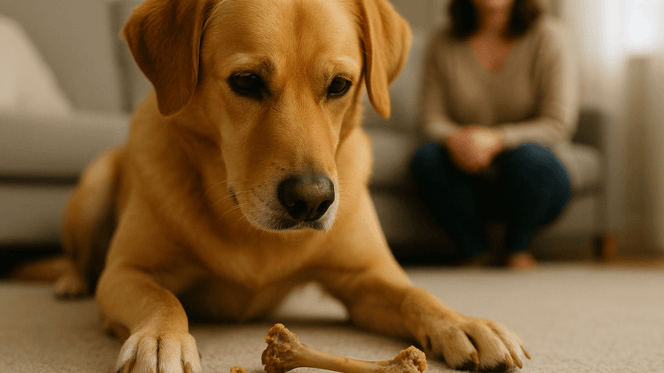The festive season often means gathering with loved ones, enjoying hearty meals, and carving into a golden roast turkey. While the family tucks in, many dogs wait patiently with hopeful eyes, eager for scraps.
As a caring owner, it’s tempting to share, but not everything on the table is safe. One of the most important questions to ask is: Can dogs eat turkey bones? The quick answer is no; it is not recommended to feed turkey bones to dogs due to the serious health risks involved.
Can dogs eat turkey bones?
Although bones may seem natural, turkey bones are fragile and unsuitable for pets. Once cooked, bones can splinter easily, posing dangers such as choking hazards, internal injuries, digestive blockages, and even internal bleeding. There is also the risk of broken teeth when dogs chew them.
So if you’re wondering whether cooked or smoked turkey bones are safe to share, the advice is clear: they are not recommended.
The hazards of turkey bones
Turkey bones may look harmless, but they can quickly cause serious problems for your dog. Their brittle structure means splintering is likely, especially after cooking. Even raw bones carry risks.
The main dangers include:
- Choking hazard if bone fragments block the airway
- Blockages in the digestive tract, which may require surgery
- Risk of broken teeth from chewing large or hard pieces
- Risk of internal bleeding if sharp fragments puncture tissue
For these reasons, vets strongly advise against offering turkey leg bones or any poultry bones.
Cooked versus raw turkey bones
- Cooked turkey bones are dangerous: heat makes them brittle and likely to shatter into sharp pieces. They are the most hazardous and should never be given to pets.
- Raw bones may be safer: uncooked bones are more flexible, but they are not risk-free. Monitor your dog closely, as raw bones can break their teeth, or get stuck in your dog's throat, causing them to choke.
While raw bones may sound safer, neither option comes without risks.
Can turkey bones kill dogs?
Sadly, yes. Turkey bones can kill dogs if a splinter causes internal bleeding, if a blockage prevents digestion, or if choking cuts off the air supply. While this outcome is not common, the possibility highlights why turkey bones are best avoided.
What to do if your dog eats bones
Dogs can be quick to grab scraps. If your pet manages to eat bones, look out for warning signs such as:
- Coughing, gagging, or drooling
- Vomiting or diarrhoea
- Constipation, straining, or blood in stools
- Loss of appetite
- Lethargy or a bloated stomach
These symptoms may indicate internal injuries or digestive blockages. Do not wait and see, contact your vet straight away.
Safe alternatives to turkey bones
There are plenty of safer ways to let your dog join in the Thanksgiving or Christmas celebrations:
- Plain cooked turkey: small portions, with no skin, bones, or seasoning. Portion control and avoiding seasonings are essential
- Commercial dog chews: designed to satisfy chewing needs safely
- Durable chew toys: rubber or nylon products made for dogs
- Healthy snacks: plain vegetables like carrots or green beans, even frozen for crunch
These safe alternatives, particularly lean plain turkey, give dogs a tasty reward without the risks.
So, can dogs eat turkey bones safely? The dangers are too great. Cooked bones are dangerous, raw bones may be safer but still carry risks, and safe alternatives are always the smarter option. Choosing treats carefully keeps your pet healthy and ensures the Christmas celebrations remain enjoyable for everyone.



